South Africans tend to be great storytellers. I know; I’m married to one. There’s an almost genetic tendency to turn a simple story into an extended monologue containing an automotive breakdown and marauding baboons. Yet, when it comes to South African chefs, few are telling stories on a plate.
The most notable exception is Bertus Basson, who has three restaurants in South Africa’s Western Cape winelands—four, if you consider The Deck, the outdoor burger joint just below his flagship Overture Restaurant. Basson is that rare culinary raconteur, whose dishes are as real and as steeped in heritage as they are modern.
His food tells stories of childhood romps along the country’s wild and windy West Coast and gun-toting game hunts with Pa in the bush. Tales translated into dishes with the basic flavors of cultural identity, yet delivered with a twenty-first century chef’s flourish and respect for food provenance.
Basson is an Afrikaner—his ancestors came from Europe more than three centuries ago—and he lives much like his grandparents did, with a vegetable garden, three dogs, chickens, wife Mareli, new baby Theodore and 330-pound pet pig Spek (Afrikaans for bacon); although in this Basson home, the pig will never be eaten.
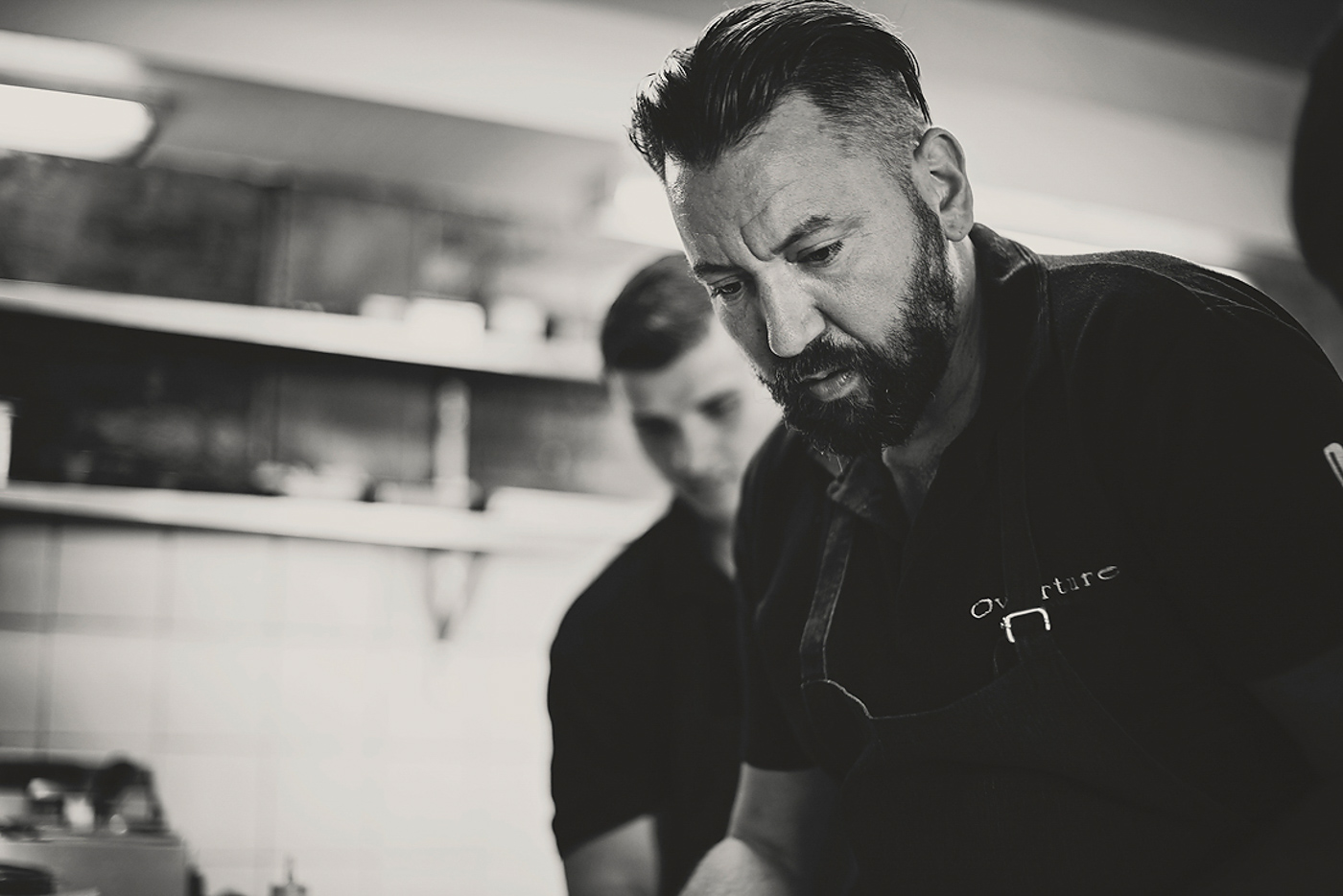
They all co-exist happily in Stellenbosch, a largely Afrikaans-speaking university and agricultural town in the heart of South Africa’s winelands. While it’s a farming area, it’s also less than an hour’s drive from Cape Town, which ensures plentiful foodie traffic to his restaurants.
With Basson, every dish is farm-to-table and laden with meaning. Take the “snacks” brought to the table, as you are seated at Overture, overlooking the heart-stoppingly beautiful hillside vineyards of Hidden Valley Wines. Basson explains, “Every braai [South African barbeque] starts with snacks; this is part of South African hospitality.”
Homemade crisps arrive with a beef fat candle; once lit, it drips onto a ring of shaved biltong—South African air-dried spiced beef. Basson calls the candle Opsit Kers, a nod to the traditional courting candle in Afrikaans culture: “When a boy arrives at a girl’s house, her father lights a candle. You may have just driven forty kilometers to see her, but when the candle goes out, you have to go!”
The snacks also include a plate of house-smoked olives with onion ash and tapenade, and bread baked from Highland Red hard wheat flour, that dunked into that growing puddle of molten beefy biltong, is unbelievably good. And there’s a bowl of pulled pastrami, pickled onion, and home-cured mustard—what Basson calls salt beef—a childhood staple that is crunchy, salty and briny. It’s cooled off by a tiny bowl of raw pea velouté with a floating smoked cheddar-filled éclair. All this before you’ve even ordered.
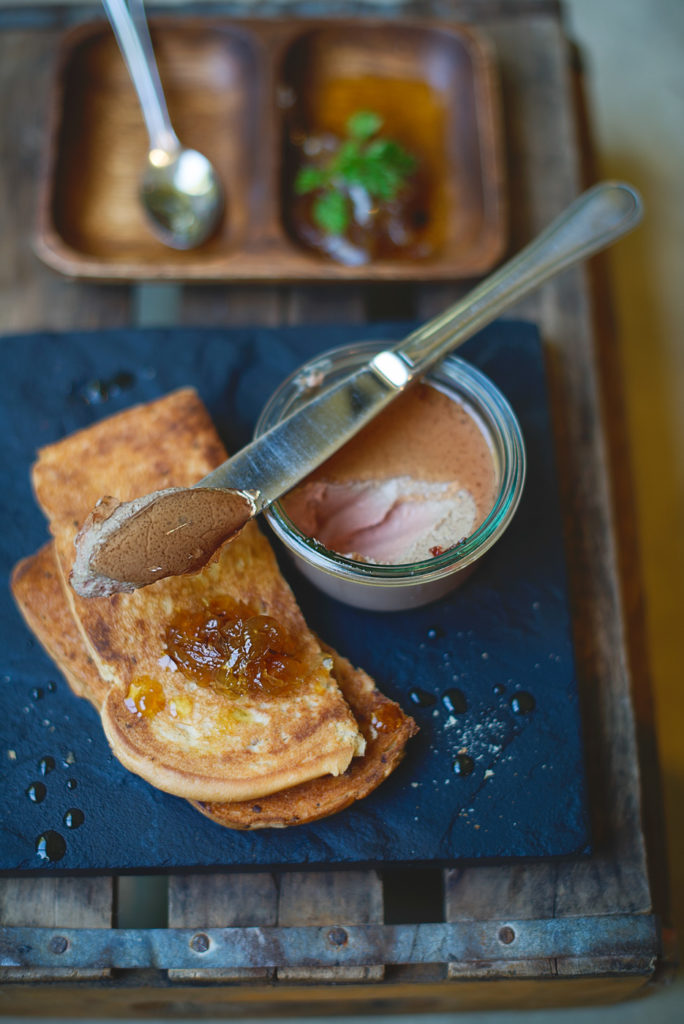
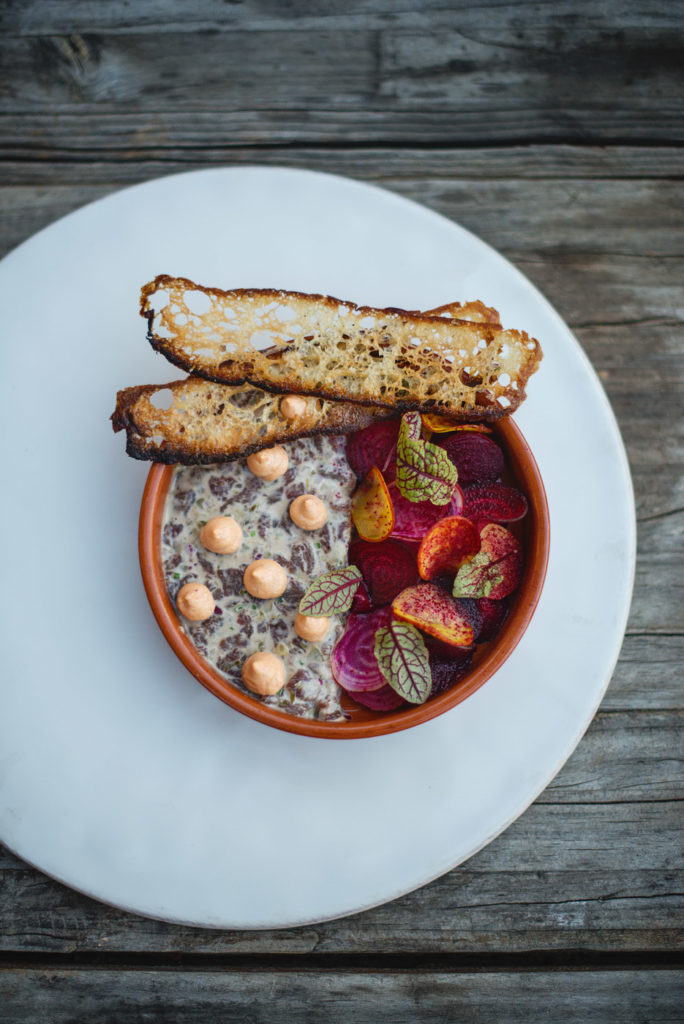
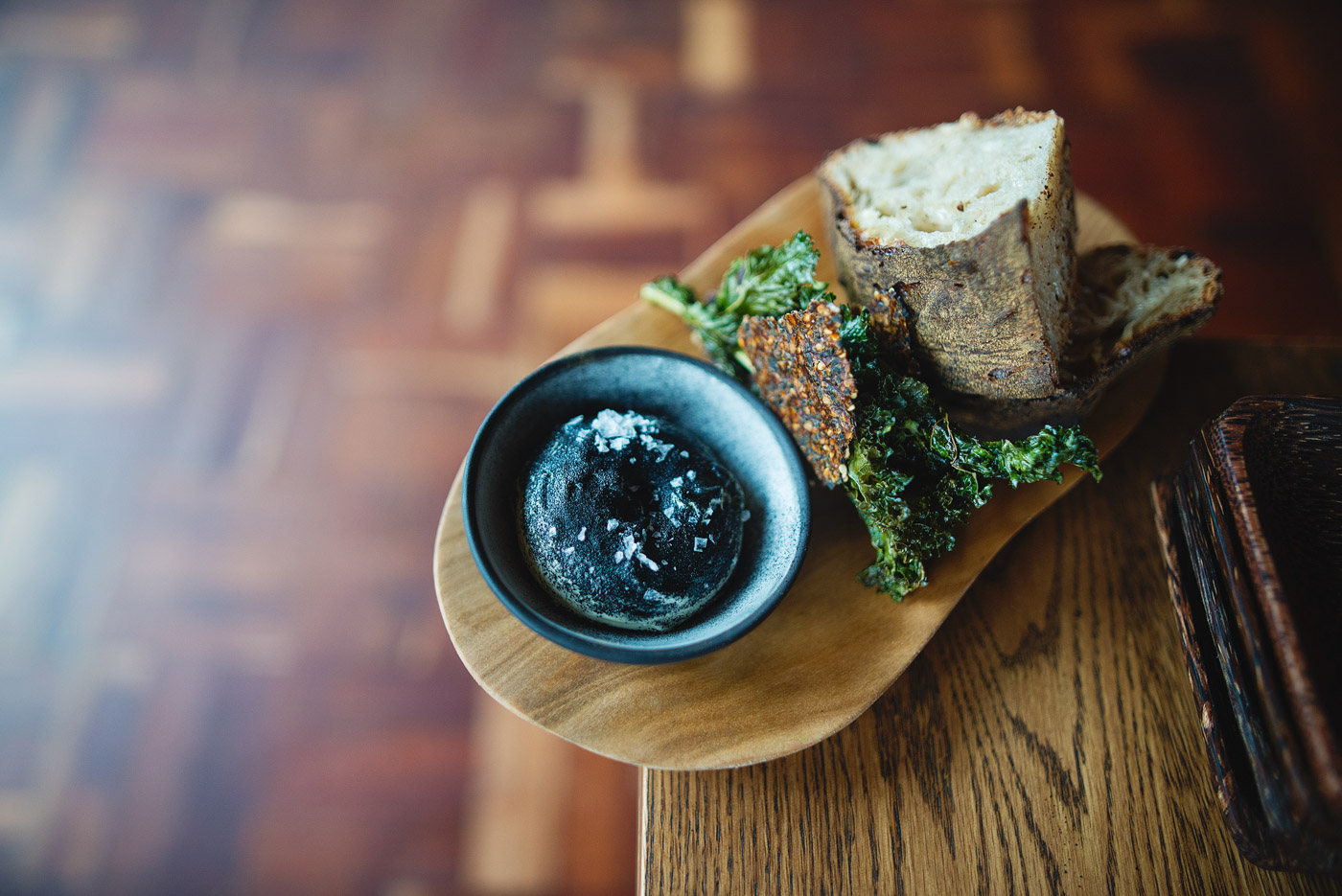
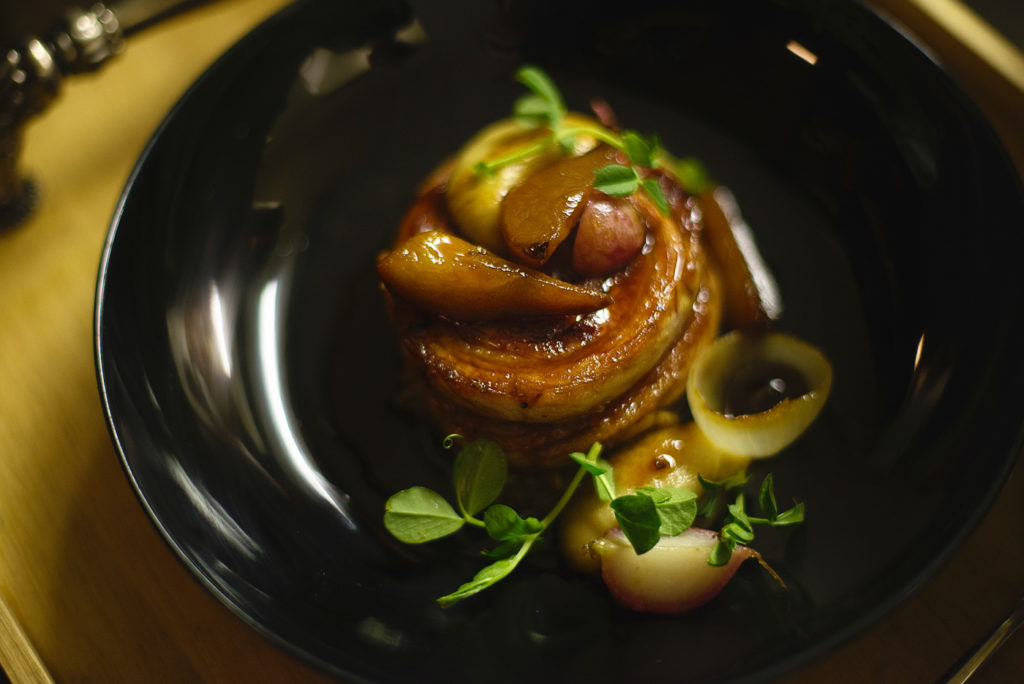
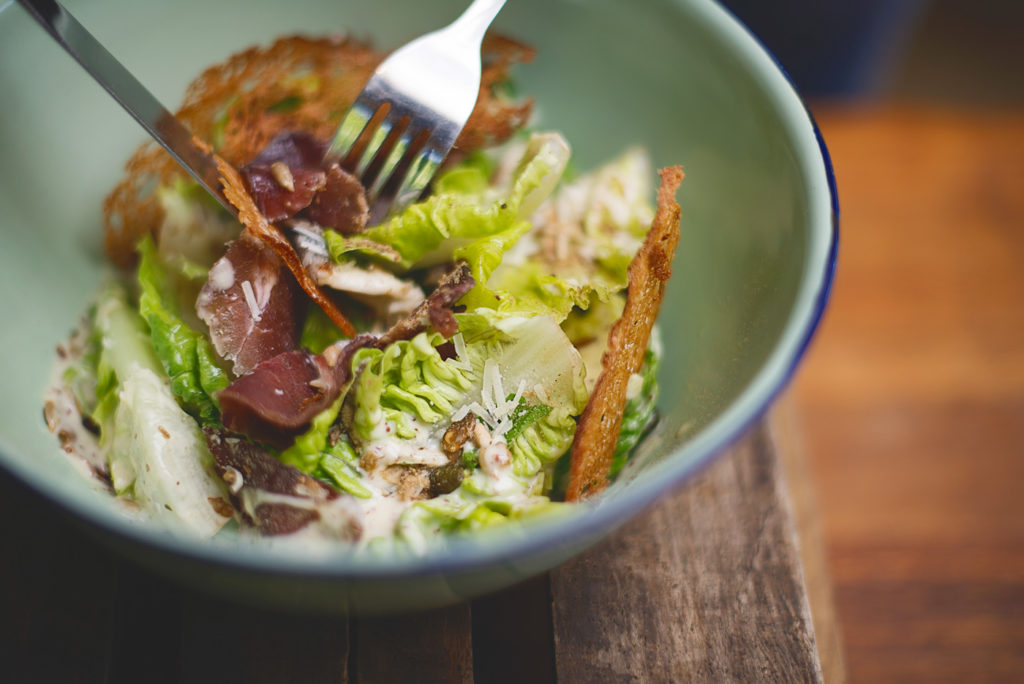
“Everything has to have a story,” says Basson. There’s Chicken and Snails, which refers to the daily battle in Basson’s garden. It’s a dish of braised snails and chicken galantine that grew out of watching his chickens hunting snails: “They’re like assassins.” And, the smoked hake and succotash starter: a complex mix of samp or stampmielies (a South African staple of partially ground maize, similar to hominy) and kale, bound with miso butter and topped with smoked olive oil-poached hake, paper-thin beet slices, chive oil, and a dusting of kale powder. “A bit of East meets West meets Africa.” It’s genesis: a North Carolina TV chef, who Basson heard talking about the history of succotash in America.
“Modern South African food used to be a club sandwich speared with a porcupine quill,” says Basson. In the twenty-three years, I’ve lived in Cape Town, I’ve watched restaurant food transition from steak and calamari in the ‘90s to the penne arrabbiata, Caesar salad, sushi, and pad thai of the new millennium. If you consider that for much of the decades-long span of apartheid, which ended in 1994, South Africa was an international pariah largely cut off from the world, it seems only natural there would be a new curiosity—even obsession—with anything considered exotic. Which doesn’t mean those dishes haven’t often been lost in translation here.
“Some of the quirky South African bits fell through the cracks in that era,” says Basson. It’s taken a while for local chefs to start tapping into their own roots, and in this, Basson has taken the lead.
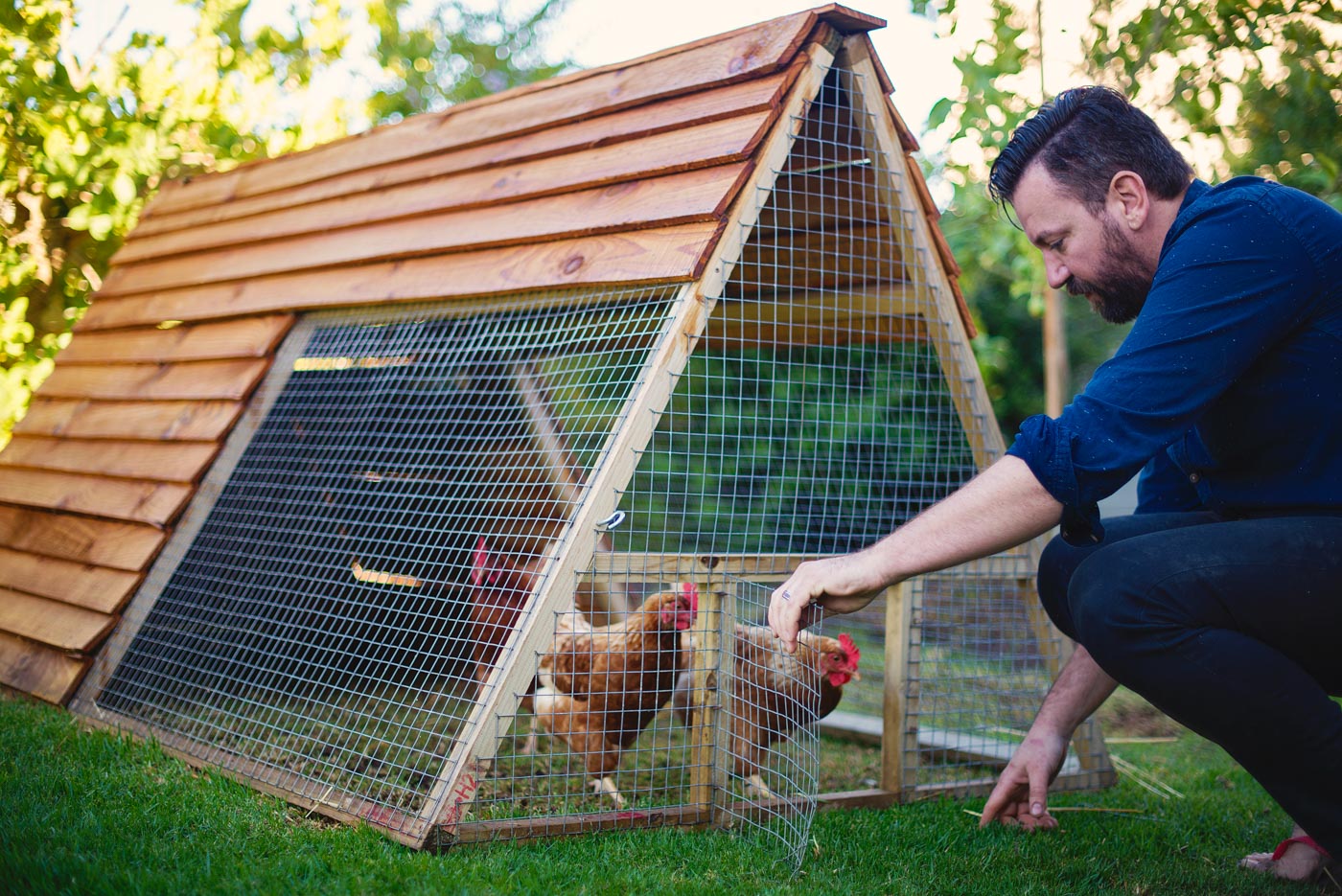
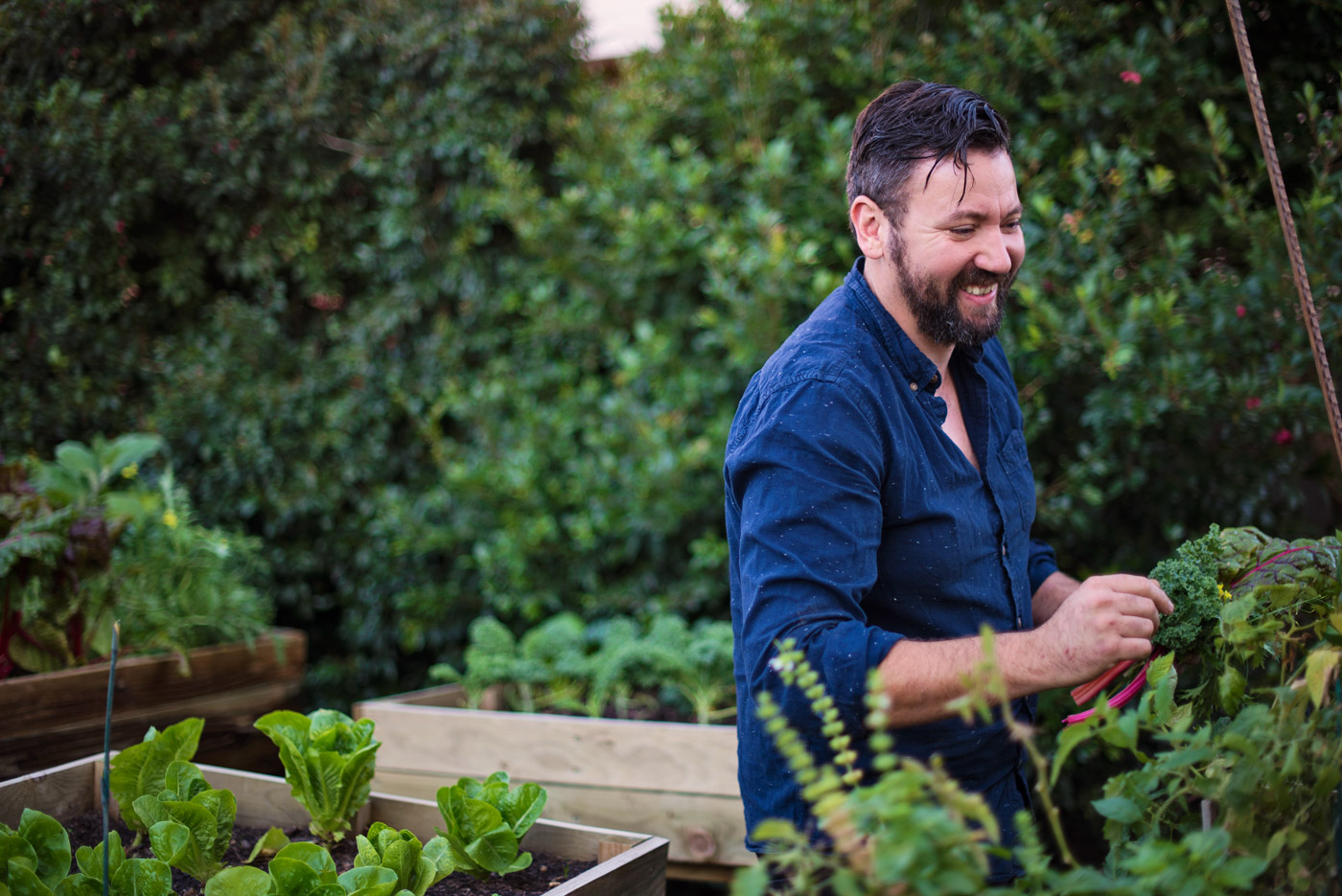
The first Basson arrived in South Africa in the late 1600s: a German who had studied town planning in Belgium. “He came with his white European wife, and while I can’t confirm this, it’s thought that he took an Indian slave wife once he was here. I’m quite dark-haired, which makes me think I come from the Indian side.”
We talk about being an Afrikaner in South Africa today, and how he comes to terms with the past, given that apartheid—which was institutionalized racism—was constructed by Afrikaners. “As a South African, you need to conceptualize yourself in your space. I am a white Afrikaans-speaking person. Our biggest mistake was in thinking we were the chosen people. We realized we aren’t. I see myself as a big part of the South African story, along with other South Africans,” Basson says. “We are living in a progressive country. We don’t long for the old days. We do long for tradition. Tradition builds personality. There are South African traditions we all have, like braaing. Food plays a massive part in our being South African.”
Afrikaners also seem to take inspiration from other traditions. “South Africans are the best thieves in the world,” Basson says. “When it comes to food, we steal from everybody. What we do as South Africans is, we say, ‘Shit, we’ll take your Indian curry pot, we’ll take your English scones, we’ll take your milk tart, your peri peri, your coriander seed, and we’ll make it our own.’”
“We are living in a progressive country. We don’t long for the old days. We do long for tradition. Tradition builds personality.”
All Basson’s restaurants serve modern South African food, but each has a different slant. “Overture is about the flavors of this place, which we interpret in a more modern and different way. At Bertus Basson at Spice Route, we realize that through that interpretation, we lose some authenticity. So we decided recently to only serve authentic South African cuisine, like what the grandmothers so unashamedly do.” The biggest seller there is bobotie, a traditional baked lamb dish with a custard topping.
Spek & Bone, which opened in 2016, is named after the Bassons’ pig and boxer—who were named after the classic dish of pork and beans. The food has a more global context, although that South African thread runs through every plate. Take the poutine. The Canadian dish of chips, gravy and cheese gets a local twist with frikkadel, Afrikaans braised meatballs, made with beef and wildebeest (gnu). The “chips” are fried fingers of organic maize—white maize is a staple for black South Africans, although this maize is coarse, unrefined, and a deep gold. The gravy is a thick flavorsome tomato sauce.
Basson, who talks a mile a minute, finds it amusing that he seems to have morphed into his grandfather, who also drove an old Land Rover, kept pigs and chickens, and grew fruit trees and vegetables. “My mom’s parents were Boer (Afrikaans) hippies. I still remember the garlic strings hanging in the house. Their love for food spilled into my mother and her sisters who all made a living through food.”
Basson and his family live in Jamestown, which was Stellenbosch’s original Coloured farming town (Coloured being the accepted term for people of Malay or indigenous heritage, or of mixed race, although that racial mix usually goes back generations). Today it is the area’s only multiracial community.
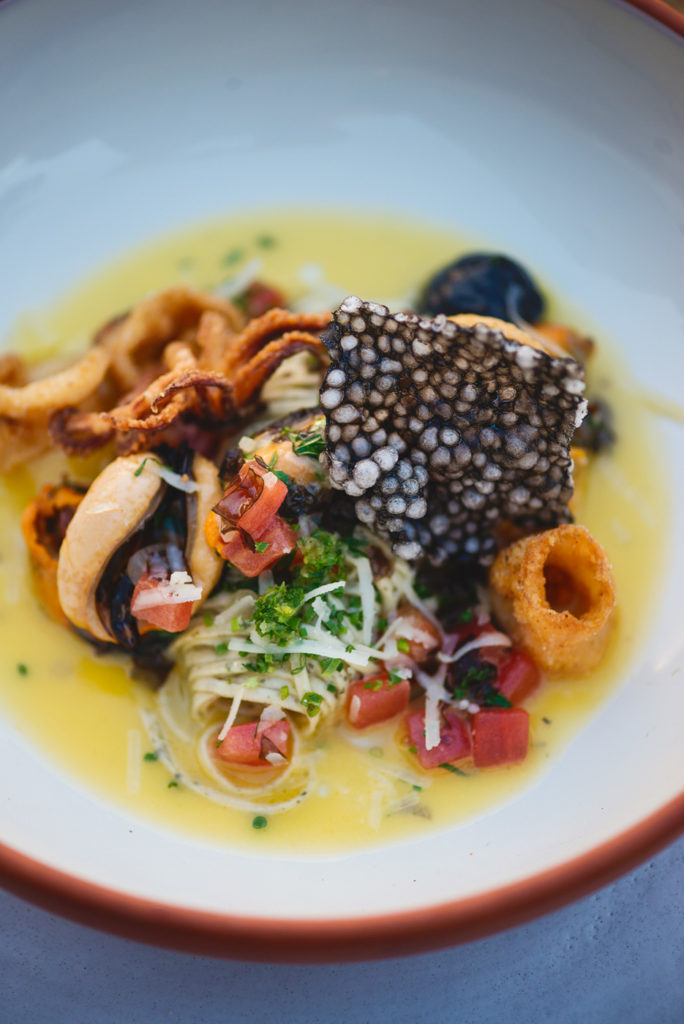
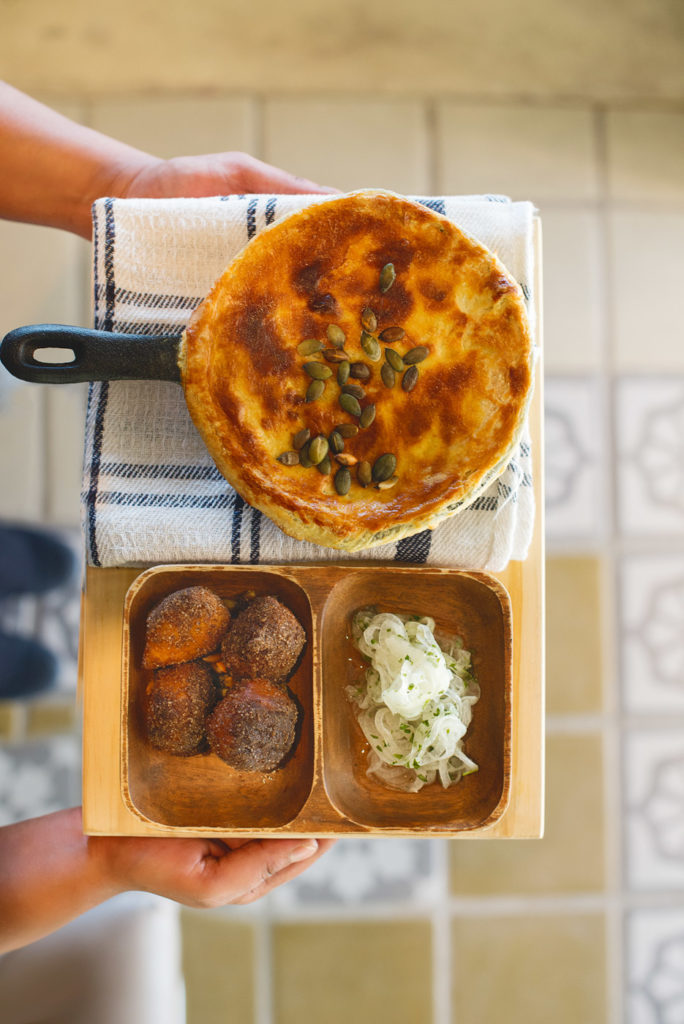
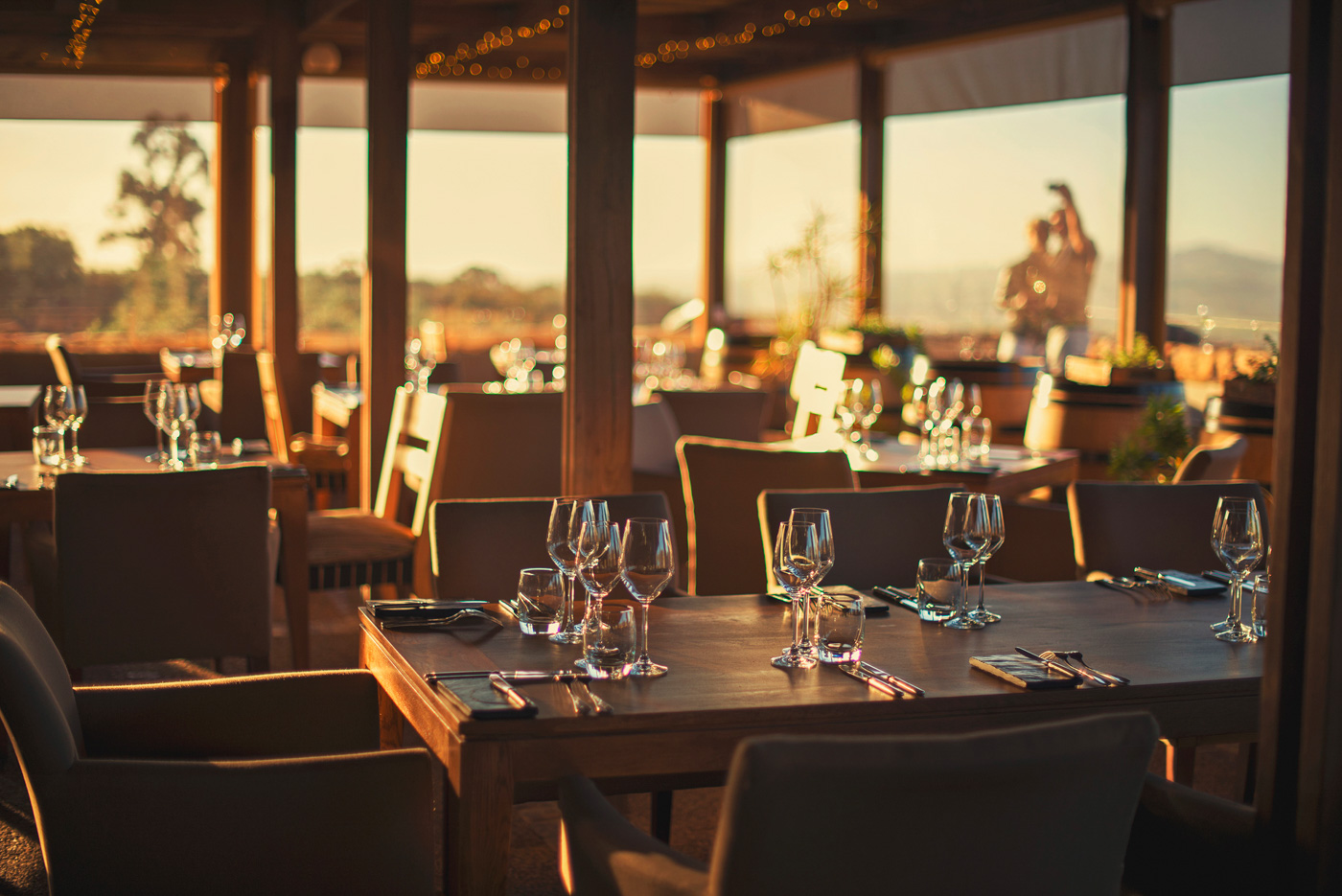
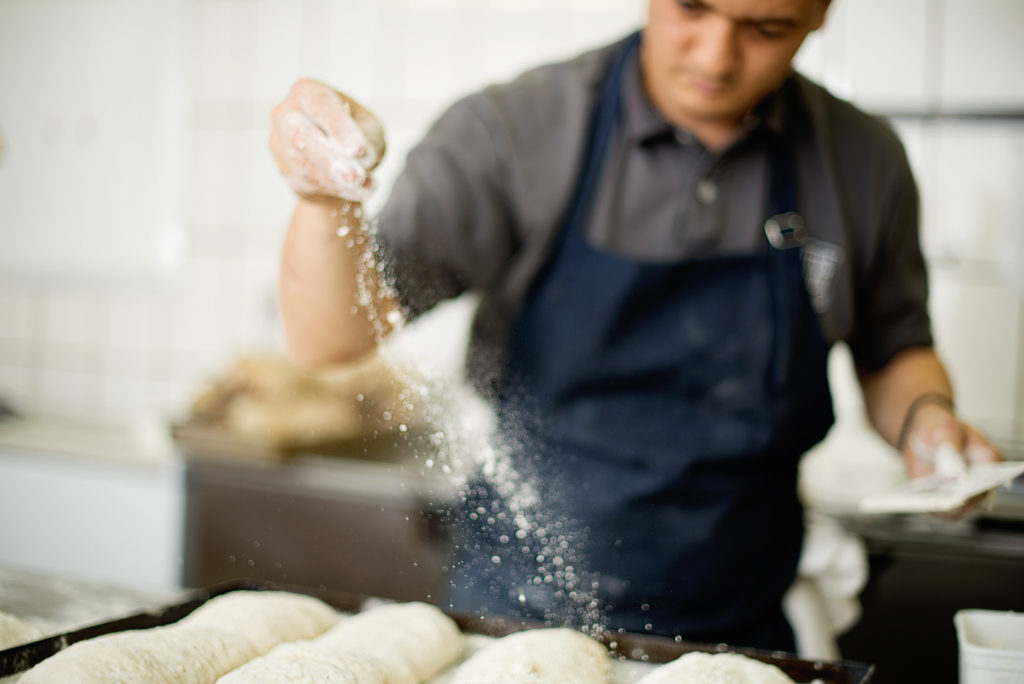
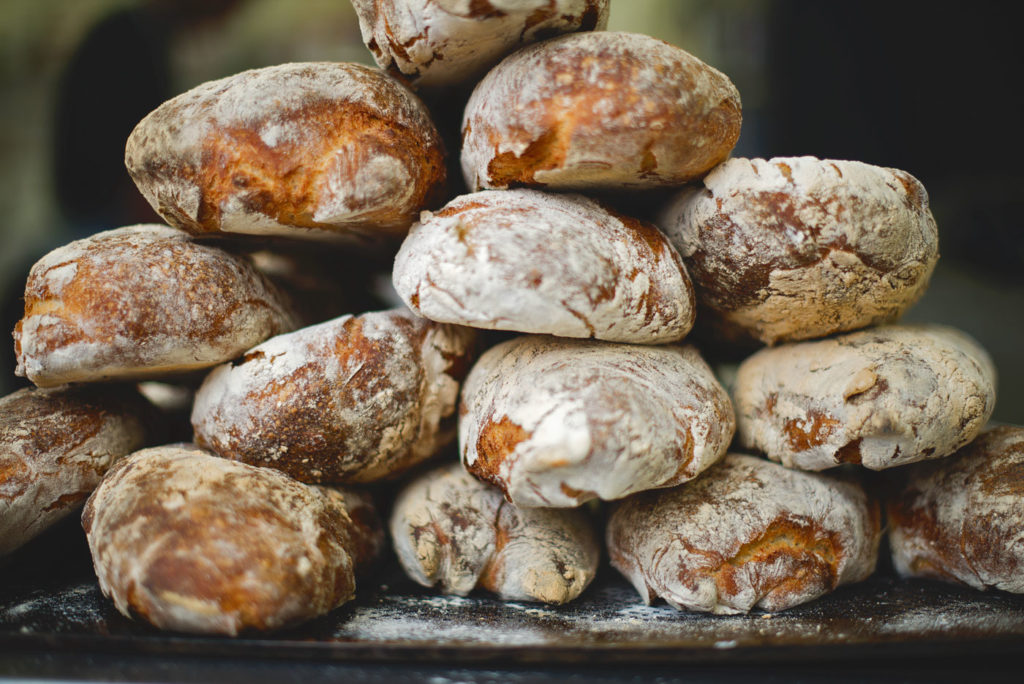
“Jamestown is an odd story. I would like it to become the norm,” he says. It’s very much like places he lived growing up, with kids playing cricket in the streets—except these kids come from different races. Some of his neighbors are comfortable; others are poor. He loves the feeling of community there and the way in which neighbors connect through food. But it is an area with great need.
“Twice a week, our truck goes to the Epping market in Cape Town where we buy extra fruit. We distribute it with the help of the community to Jamestown’s pre-primary schools. Every Friday we feed about two hundred people in the community from the Overture kitchen with soup and our own baked bread. We make what we call a Mountain View soup with saved vegetable trimmings and pulses.”
Basson takes pride in using plants completely. Broccoli flowers from broccoli plants and the whole radish plant: leaves to braise, the pod to serve raw and the radish itself. Besides the bulbs, he uses leaves from his kohlrabi like marogo, wild South African greens, and braises them.
When the Bassons moved to Jamestown four years ago, they started a home vegetable garden, and later bought and transformed another plot into a second garden. Here, they grow most of the herbs for the restaurants, as well as kohlrabi, kale, beets and tomatoes. One of his dishwashers spends two days a week maintaining the garden.
But his home garden can’t satisfy the produce needs for his three restaurants; the rest comes from two local organic farms. “We maintain our standards through quality produce and use the same suppliers for all our restaurants: it doesn’t matter what the price points are.” Basson is adamant that the production of food is as important as the consumption of food. And about the role chefs play in a country in which there is great need. “We have to be very careful in this industry. In South Africa, we’ve got this great divide between middle class, rich and poor. Price point is a big issue. Food is expensive. Very few people can afford to eat in one of our restaurants. That’s the sad reality. Yet when I go to Spice Route and I see how diverse the food is and the diversity of the guests; that’s quite cool.”
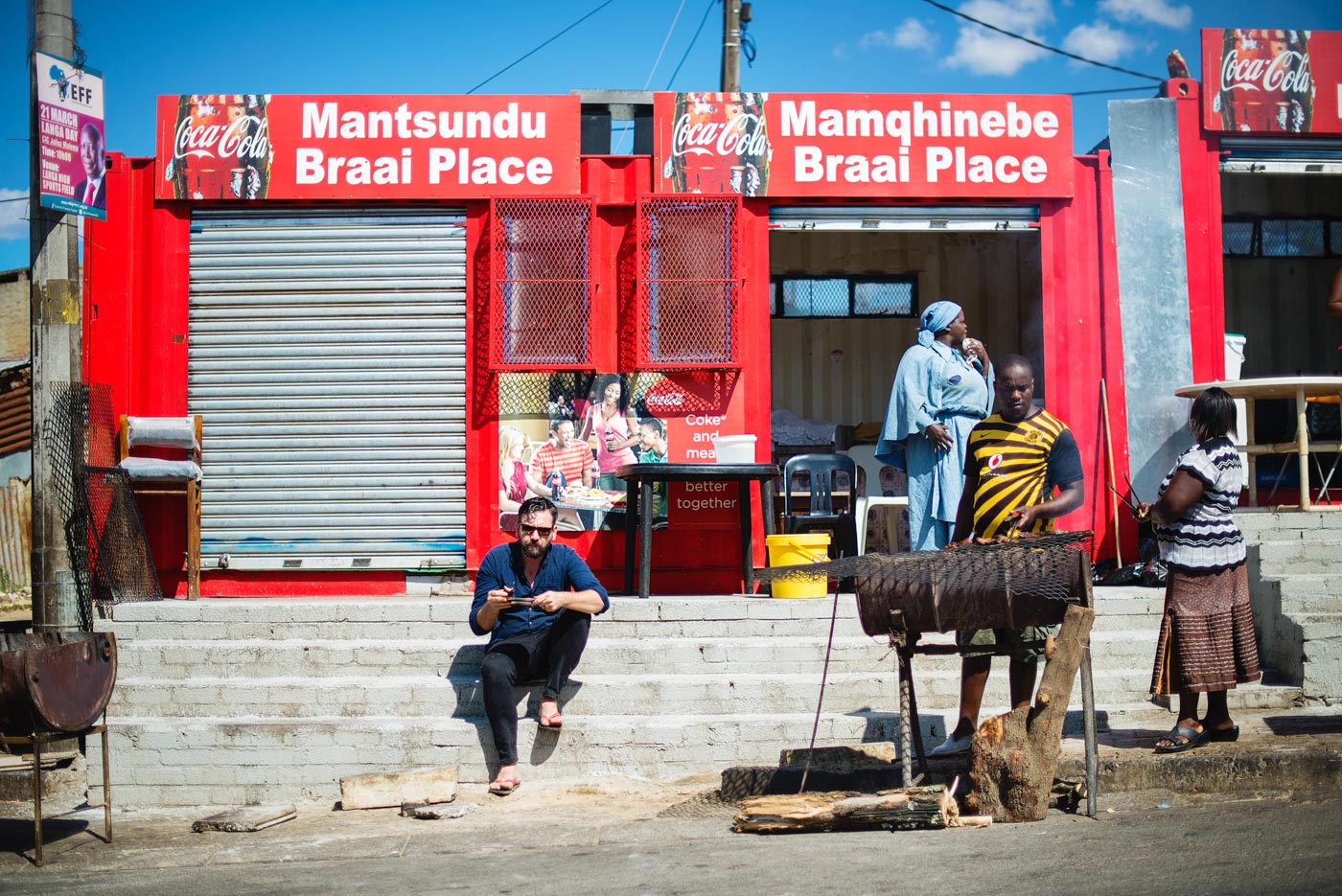
Basson sees this as an opportunity to engage with those diners and the community. “We’ve got this ability and responsibility to involve more people with food, whether they be consumers or cooks. It’s a big part of our social responsibility. We employ young people, old people—people from all walks of life. We’ve realized over time that we can’t take everybody with us, but we can provide opportunity.”
Since Overture opened in 2007, that opportunity has been extended in a big way; Bertus Basson has become an operation that now has seventy employees. And with Basson, it does not seem that growth is slowing. He’s done several TV series (although he’s adamant that TV will always be secondary to his restaurants), a cookbook, a food truck, and the burger deck. There are more restaurants, a second book and a bunny chow (curry-stuffed loaf of white bread) food truck in his future.
“Sometimes I do call myself the dancing monkey. I love it. I’m plugged in seven days a week and spend more time in my car and on the phone than anything else,” he says. But Basson still pulls scheduled shifts at each restaurant. It’s what he loves most, besides being South African.





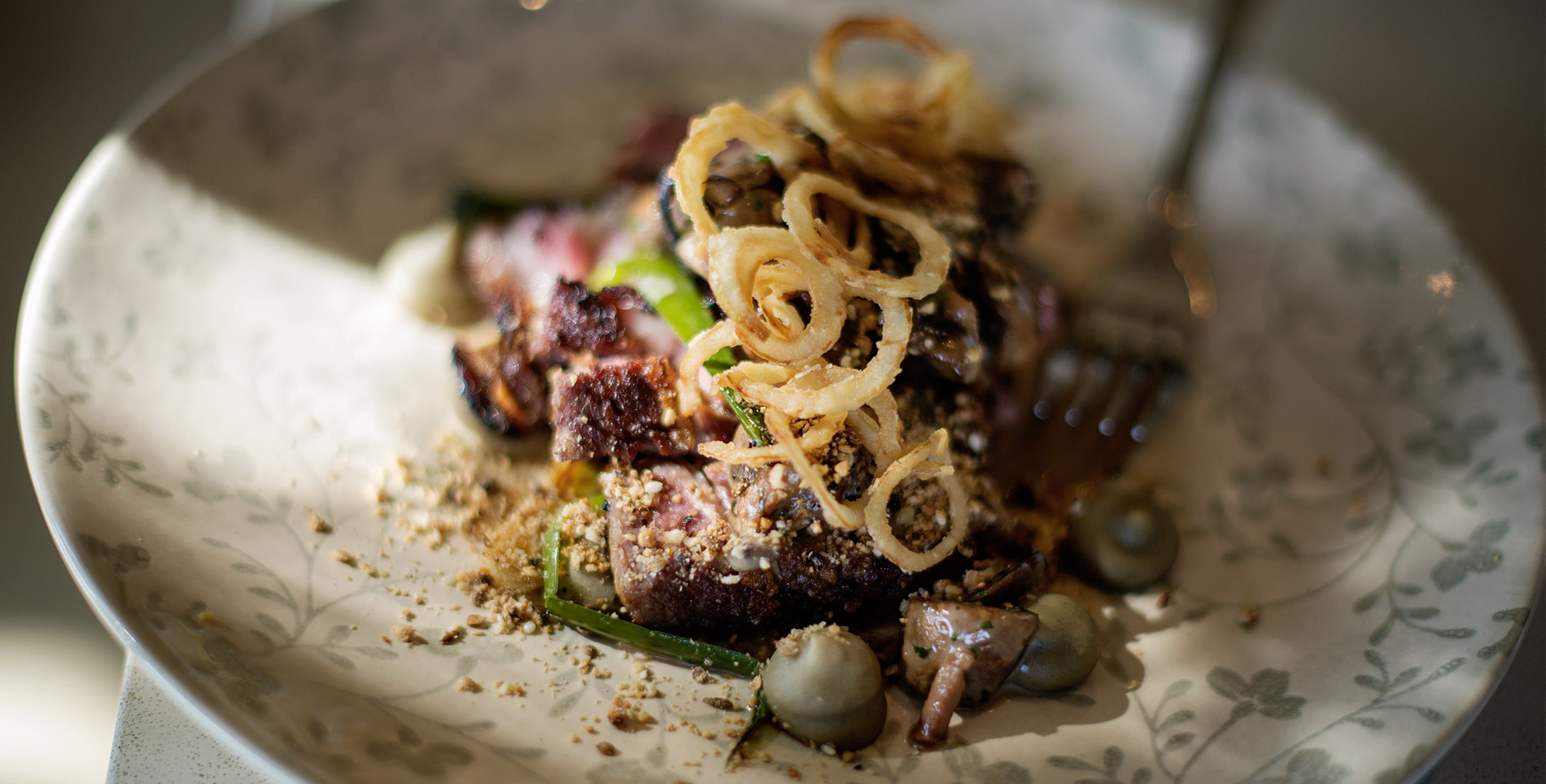

Our comments section is for members only.
Join today to gain exclusive access.